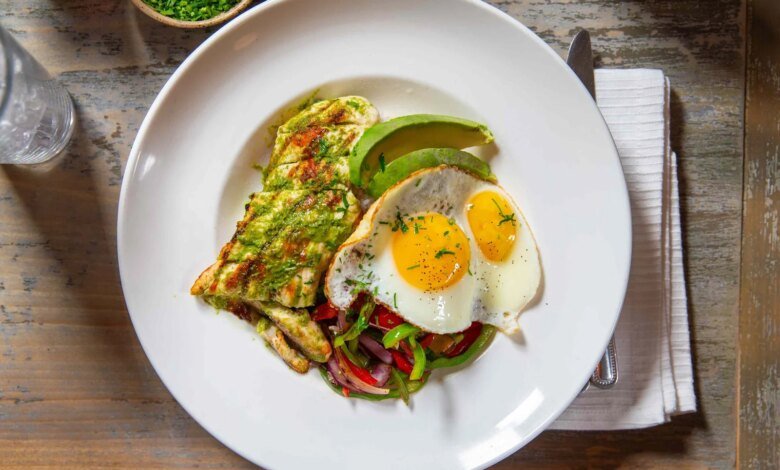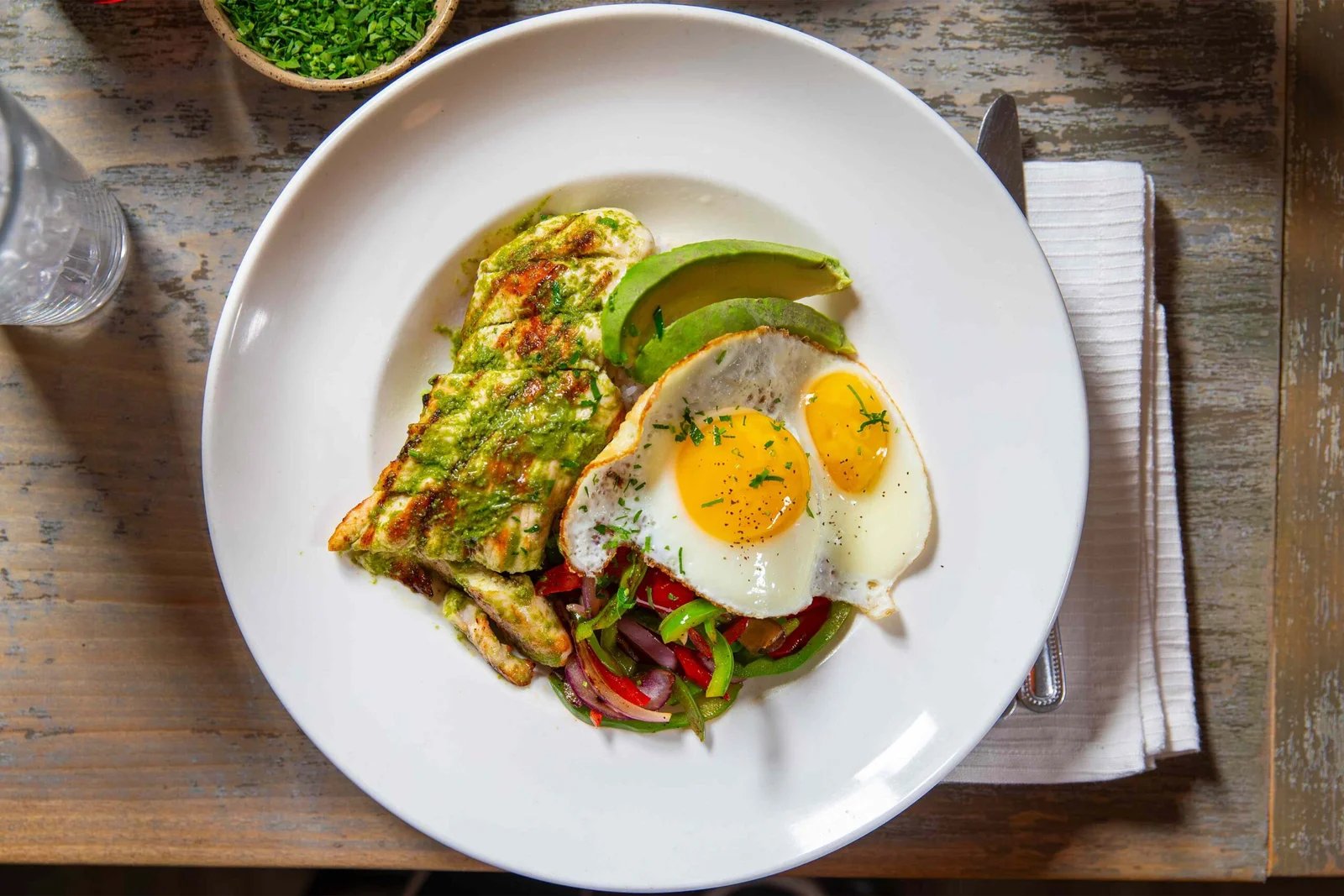6 Healthiest Breakfast Meats, Ranked


Breakfast meats vary in protein, fat, sodium, and sugar content. They also differ in how they are made and the ingredients they contain.
You can eat all types of meat in moderation. Opt for whole cuts of meat or those that are less processed and contain fewer additives.
Chicken breast without skin is high in protein and lower in saturated fat than turkey and beef. It’s packed with B vitamins that help your body produce energy.
3 ounces (oz) or 85 grams (g) of cooked chicken breast has:
- Calories: 128 kcal
- Protein: 25.9 g
- Total fat: 2.6 g
- Saturated fat: 2.2 g
- Carbohydrates: 0 g
- Sodium: 52 milligrams (mg)
Chicken wings have more fat than chicken breast. One raw, skinless wing (about 30 grams) contains 6.3 grams of protein and 1 gram of total fat. Frying chicken wings increases their fat and sodium (from added salt and spices).
Turkey is high in protein and has lower saturated fat than beef. It is also low in sodium.
Turkey is rich in B vitamins, including vitamin B12. Vitamin B12 is crucial for brain and nervous system health. A deficiency in vitamin B12 can lead to anemia (low red blood cell count), fatigue, numbness or tingling, and difficulty concentrating.
Turkey also provides minerals such as selenium and zinc. Selenium helps support thyroid and reproductive function and protects cells from damage. Zinc is important for cell growth and repair as well as overall immune health.
Three ounces (85 grams) of cooked ground lean turkey has:
- Calories: 173 kcal
- Protein: 23.3 g
- Total fat: 8.8
- Saturated fat: 2.2 g
- Carbohydrates: 0 g
- Sodium: 66.3 mg
Salmon and other fatty fish are rich in protein and omega-3 fatty acids. Your body needs omega-3 fatty acids to support cell function, hormone synthesis, brain function, heart health, eye health, and the immune system.
A serving of cooked salmon also provides 108% of the Daily Value (DV) for vitamin B12 and 72% of the DV for selenium.
Three ounces (85 grams) of cooked salmon has:
- Calories: 155 kcal
- Protein: 21.6 g
- Total fat: 6.9 g
- Saturated fat: 1 g
- Carbohydrates: 0 g
- Sodium: 47.6 mg
Lox, or cured salmon, is usually eaten on bagels. It’s preserved with salt, smoke, or other chemicals. One ounce (28 grams) of lox contains 567 milligrams of sodium, which is about 25% of the daily limit. For a lower-salt, nitrate-free option, try whole fish like canned sardines or cooked salmon.
Beef has higher total and saturated fat than other meats. It’s rich in B vitamins, zinc, and selenium.
Corned beef hash made of ground beef is a common meat-based breakfast food. Three ounces (85 grams) of cooked ground beef (90% lean) has:
- Calories: 196 kcal
- Protein: 24.1 g
- Total fat: 10.2
- Saturated fat: 4 g
- Carbohydrates: 0 g
- Total sugars: 0 g
- Sodium: 74 mg
Liver is an organ meat that contains more saturated fat than poultry or fish. However, it’s also packed with nutrients like ironzinc, copper, choline, vitamin B12, other B vitamins, and vitamin A.
A serving of beef liver provides about 2,500% of the DV for vitamin B12, 891% of vitamin A. Vitamin A supports wound healing, eye and heart health, and the immune system.
Liver is also one of the few food sources of vitamin D.
Three ounces (85 grams) of braised beef liver has:
- Calories: 162 kcal
- Protein: 24.7 g
- Total fat: 4.4 g
- Saturated fat: 2.5 g
- Carbohydrates: 4.3 g
- Sodium: 67.2 mg
Pork ham and bacon are common breakfast meats. They have higher sodium than whole pork cuts. Choosing whole pork cuts gives you more protein and less sodium and fat.
However, pork is still higher in fat and lower in protein compared to beef, poultry, liver, and fish.
Pork is a good source of B vitamins, zinc, and selenium, too.
Three ounces (85 grams) of cooked ground pork has:
- Calories: 252 kcal
- Protein: 21.8 g
- Total fat: 17.7 g
- Saturated fat: 6.5 g
- Carbohydrates: 0 g
- Total sugars: 0 g
- Sodium: 62 mg
If you choose pork ham, opt for lean varieties. A slice of lean ham (13 grams) provides 2.2 grams of protein and 0.5 grams of fat.
The American Heart Association (AHA) recommends limiting saturated fat intake to 6% of total calories, which is about 13 grams daily for a 2,000-calorie diet. Pork is higher in saturated fat, with one serving providing almost half of the daily limit for most people.
Meats can be great for a high-protein breakfast. Here are a few things to consider when picking out breakfast meats:
- Opt for lower-sodium options: Whole meats don’t have much sodium. However, deli meats, sausages, bacon, or cured fish can be very high in sodium. Read the nutrition facts labels and choose the ones with the lowest sodium. The AHA recommends limiting sodium intake to 2,300 milligrams or less a day.
- Choose meats low in saturated fats: Meat contains saturated fat. Choosing whole, lean meats can help reduce some of the fat. Pork and beef have more fat than chicken and turkey. Deli meats, cured meats, and sausages usually have the highest saturated fat.
- Choose high-protein varieties: Whole meats are high in protein. Deli meats like pepperoni, salami, ham, and bologna tend to have lower protein and higher saturated fat.
- Opt for whole meats: Processed meat products like deli meats are often cured with nitrates. Synthetic nitrates (nitrites used to cure meats) are linked to an increased risk of heart disease and cancer when eaten frequently.
Here are some breakfast meats to limit:
- Deli meats (ham, salami, bologna, pepperoni): These are high in sodium and fat. They often contain preservatives like nitrates.
- Cured meats: Processed meats are often cured with nitrates, salt, or smoke. The curing process increases sodium and can add chemicals linked to health concerns.
- Breakfast sausages: These are usually high in saturated fat and salt. They can be made from different parts of the animal, including trimmings. Breakfast sausages often contain preservatives and other additives.
- Bacon: It’s often cured with nitrates and is also high in salt and fat.
- Lox (cured salmon): Lox contains too much sodium and may be cured with smoke or nitrates too.
- Anchovies: Anchovies contain too much sodium.
Note: You can also opt for meatless, high-protein alternatives for breakfast. These include eggs, Greek yogurt, cottage cheese, tofu, tempeh, nuts, nut butters, and seeds.
Disclaimer: This news article has been republished exactly as it appeared on its original source, without any modification.
We do not take any responsibility for its content, which remains solely the responsibility of the original publisher.
Disclaimer: This news article has been republished exactly as it appeared on its original source, without any modification.
We do not take any responsibility for its content, which remains solely the responsibility of the original publisher.
Author: uaetodaynews
Published on: 2025-10-14 09:16:00
Source: uaetodaynews.com




